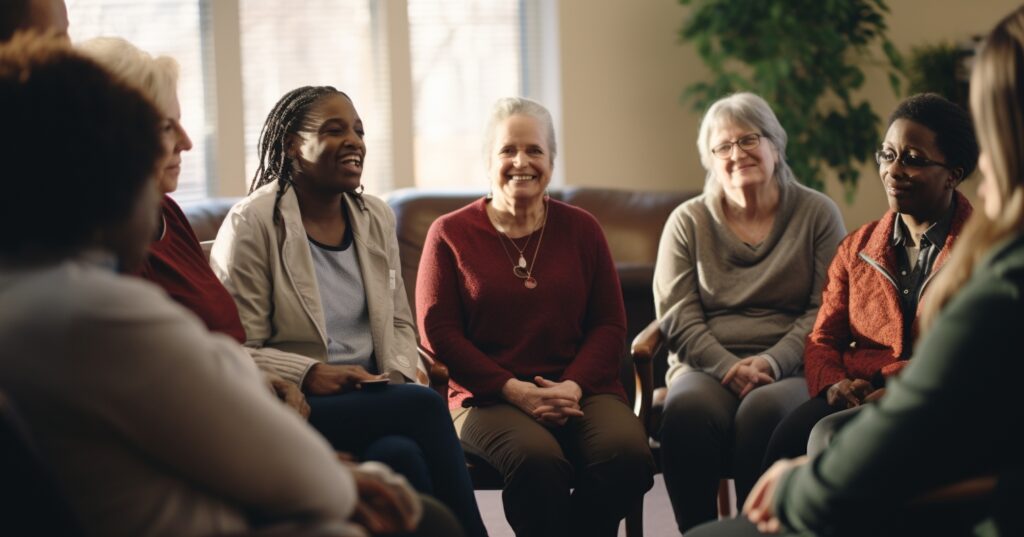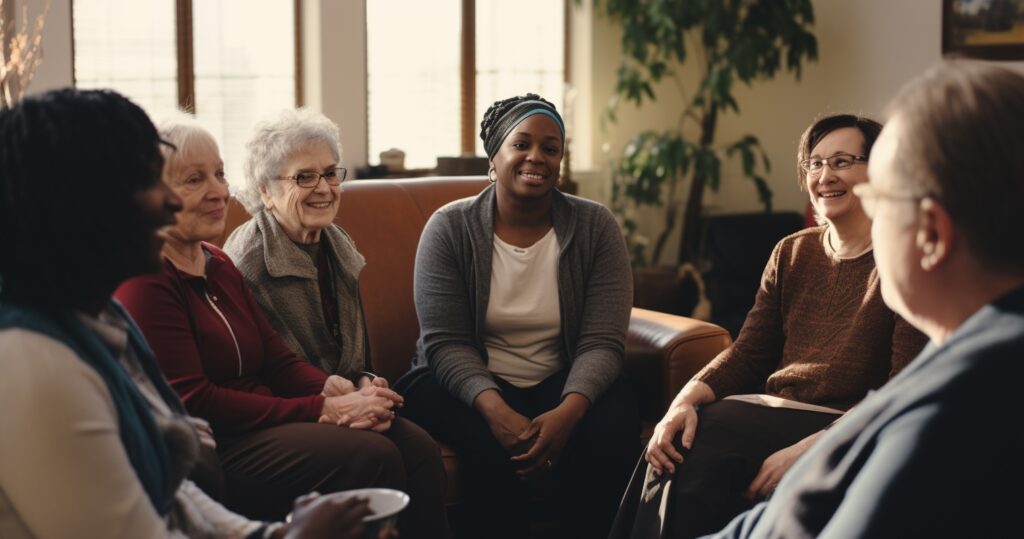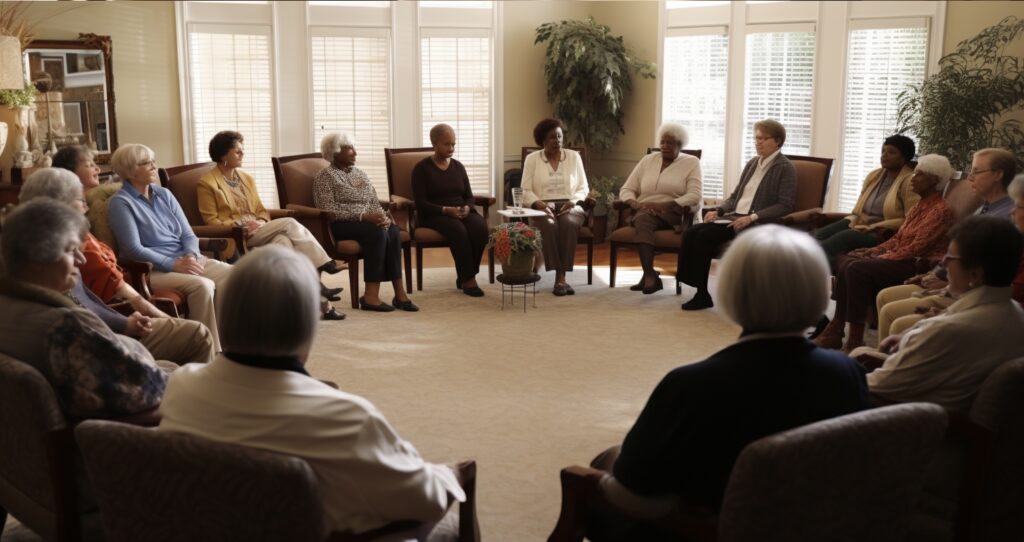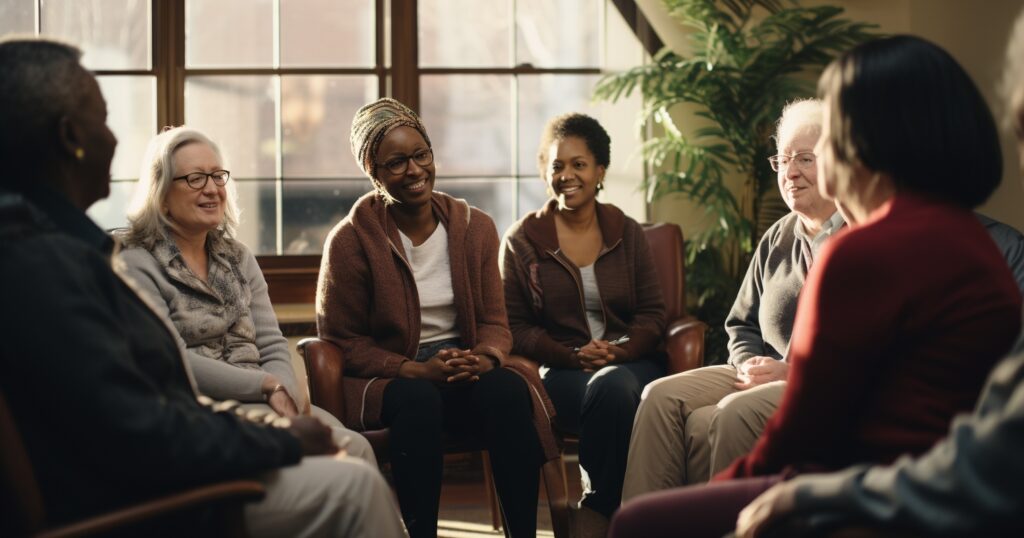The Isolation of Caregiving
It was on a crisp autumn morning that I found myself utterly overwhelmed. The weight of caregiving had slowly, yet unmistakably, become an insurmountable mountain in my life. With every doctor’s appointment, every therapy session, and every emergency, a part of me felt drained. It wasn’t just the physical toll but the emotional and mental exhaustion that seemed unending. In the quiet moments, when the world seemed to pause, I’d often question, “Am I the only one feeling this way?” While often not discussed, the solitude of caregiving is a reality many of us face. It’s an isolating journey, making us yearn for understanding, empathy, and most importantly, a place to share and be heard – the right caregivers support group is necessary.
The Silent Battle Behind Closed Doors
In my years dedicated to caregiving, I’ve recognized a pattern: the quiet battles many of us face, often hidden behind closed doors. It’s a world where sleepless nights, worries, and silent tears become frequent visitors. Yet, how many of us actually vocalize these struggles? How many of us reach out for a shoulder to lean on, a caregivers support group to rely on? Too often, pride or fear holds us back. We internalize, believing that we must bear the burden alone, or that our challenges might be insignificant compared to others. But in truth, every caregiver’s journey is unique, and every story deserves to be heard. Seeking support isn’t a sign of weakness; it’s a testament to our strength and the love we hold for those in our care.
The Value of a Caregivers Support Group

Shared Experiences: The Anchor in Our Stormy Seas
Throughout my journey in the caregiving realm, I’ve often felt the weight of isolation. The endless tasks, the emotional rollercoasters, the moments of self-doubt. But in the midst of all this, I’ve found solace in one powerful realization: I’m not alone. A profound strength emerges when individuals with shared experiences come together. It’s like finding a beacon of light in a stormy sea.
In support groups, I’ve discovered a sanctuary. Here, stories resonate with each other, forming a symphony of understanding and empathy. No matter how unique, each story fits into this intricate puzzle of caregiving. Each voice validates the other, reminding us that our feelings, struggles, and triumphs are seen and acknowledged. It’s not just about airing our grievances, but about forging connections, learning from others, and drawing strength from the collective. After all, in the tapestry of caregiving, every thread counts.

The Solace of Being Understood
Navigating the caregiving journey often felt like treading a path laden with shadows, each step echoing with the weight of responsibility and emotional toll. But amid these shadows, one of the brightest lights I’ve found is the simple act of being truly seen and heard. When we share our narratives, we’re not just recounting events; we’re offering fragments of our souls.
In a support group, every nod of understanding, every shared tear, and every moment of laughter brings a kind of healing that’s hard to articulate. A magic transpires when you share a struggle and someone responds with a simple, “Me too.” It’s as if the burdens lighten just a bit, knowing that someone else truly understands the depth of the emotions.
I remember a particular evening, the room heavy with shared stories of exhaustion and sacrifice. Then, a new member hesitantly spoke of her guilt for desiring a few hours to herself. The room responded with a chorus of agreement. It was a poignant reminder that our feelings are valid, and we’re not alone in them. This is the beauty of a community of peers: it provides the comforting reassurance that, in our most vulnerable moments, we are seen, we are heard, and most importantly, we are deeply understood.
What to Look for in a Caregiver Support Group

The Mosaic of Caregiving Stories
When I first entered the realm of caregiving, I had this preconceived notion that our stories would be homogenous—variations on a single theme. But how wrong I was! Every caregiver I’ve met, every story I’ve heard, has added a unique color to the canvas of our shared experiences.
Although united by our roles, each of us embarks on a distinct journey. For some, caregiving is a gradual transition, a slow dance with the twilight years of a loved one. For others, it’s a sudden plunge into a world of medical jargon, endless appointments, and sleepless nights. Some navigate the complexities of dementia, while others grapple with the challenges of physical disabilities.
I’ve met caregivers who stepped into the role fresh out of college, their youth juxtaposed against the age and fragility of the ones they care for. I’ve also spoken to elderly spouses, their love stories spanning decades, now recast in the roles of patient and caregiver.
These diverse narratives remind me that while we share a common thread of love, duty, and sometimes desperation, our stories are uniquely our own. Each tale, whether of heartbreak or hope, adds depth and dimension to our collective understanding of what it means to care for another. In a support group, this diversity is our strength. It allows us to approach problems from different angles, offer varied solutions, and, most importantly, find solace in the myriad reflections of our own journeys.

Guided by Experience: The Pillar of Expertise
I’ve always believed that while empathy is the heart of a support group, expertise is its backbone. Navigating the intricate maze of caregiving requires emotional support and informed guidance. And who better to provide this than those who’ve walked this path before or have been trained to guide others through it?
In my own journey, I remember a particular evening. Weighed down by the enormity of my responsibilities, I attended a session led by a seasoned caregiver. The insights she shared, the wisdom she imparted, were not just theoretical knowledge; they were forged in the fires of her own experiences. That evening, I left with not just emotional solace but also practical solutions.
Similarly, having professionals guide these groups can be transformative. They bring with them a wealth of knowledge about medical, financial, and logistical aspects that many of us might be unaware of. Their expertise can help caregivers avoid common pitfalls, saving them time and resources and heartbreak.
In essence, while the camaraderie of peers is invaluable, the guidance of experts offers a roadmap in a journey often marked by uncertainty. Choosing a caregiver support group with such seasoned leaders can be a beacon of light in the often-overwhelming darkness of caregiving.
Embracing the Digital Age: The Power of Accessibility
Over the years, as I’ve navigated the complex world of caregiving, I’ve come to value accessibility more than ever. It’s not just about being able to reach out, but how and where we can connect. The landscape of support has evolved, and in this digital age, we’re no longer confined to physical boundaries.
I recall a time when I desperately needed to attend a support group session but was held back by a sudden commitment. I felt isolated and trapped. But then I discovered virtual caregiver support groups. These platforms, often hosted via video conferencing apps, became my lifeline. Whether I was at the hospital, on a short break at work, or even overseas attending to a family emergency, I could log in and find the support I needed.
On the flip side, in-person meetings have their own charm. The warmth of a human touch, the intimacy of shared silences, and the simple pleasure of a cup of coffee shared among peers are experiences that virtual platforms can’t replicate.
Hence, when choosing a support group, consider the modes of communication they offer. Having both in-person and virtual options provides caregivers with the flexibility to choose what fits their schedule and emotional needs best. It’s about ensuring that support is always at our fingertips, regardless of where life might take us.
The Sanctuary of Trust: Ensuring Confidentiality
One of the most pivotal aspects of any support group, in my experience, is the sanctity of the shared space. A safe haven, if you will. When I first began attending caregiver support groups, the weight of my responsibilities felt like a shroud, and I was uncertain if I could ever voice my most pressing concerns.
But then, in one particularly intimate session, I watched as a fellow caregiver, eyes glistening with unshed tears, shared her deepest fears. The group listened, nodding in empathy, but what struck me most was the unspoken agreement that her words would remain within those four walls. It was then that I truly understood the importance of a confidential environment.
Support groups are more than just gatherings; they’re sanctuaries where caregivers can express their vulnerabilities without the fear of judgment or unwanted gossip. This privacy assurance often empowers members to share more freely, fostering deeper connections and understanding.
If you’re considering joining a group, ensure it prioritizes confidentiality. Trust forms the foundation for the depth of support and understanding you receive.
The Digital Bridge: Embracing the Online Realm
In recent years, I’ve watched with fascination as the digital world has reshaped various facets of our lives, from shopping to learning and, yes, even caregiving. When I first began my caregiving journey, the idea of seeking support online seemed foreign, almost impersonal. But as life’s demands grew, I longed for a connection that fit into my sporadic schedule.
And then, I stumbled upon online caregiver support groups. These platforms, available with just a click, became my solace during late nights when sleep eluded me or during early morning hours before the world awoke. The beauty of online groups lies not just in their convenience but in their expansive reach.
Through these platforms, I’ve connected with caregivers from different continents, each with their unique perspectives and experiences, yet bound by a common thread. The shared wisdom, the sense of camaraderie, and the knowledge that someone, somewhere, understands your journey are invaluable.
For those hesitant about online groups, I urge you to try them. In an increasingly digital world, they offer a bridge, linking caregivers across geographies and time zones, united in purpose and understanding.
The Undeniable Power of Face-to-Face Connections
While the digital realm provides a bridge to connect with fellow caregivers globally, I often find myself reminiscing about the early days of my caregiving journey. The days when I would sit in cozy rooms, sipping lukewarm coffee and looking into the eyes of fellow caregivers. Those face-to-face meetings held a magic of their own, a tangible sense of connection that words on a screen can sometimes struggle to replicate.
I recall one such meeting where a fellow caregiver, with tears glistening in her eyes, shared her heart-wrenching journey. As she spoke, I felt her pain, her hope, and her resilience. We all did. The room, filled with nods of understanding and soft murmurs of comfort, became a sanctuary of shared experiences. And in that moment, I truly grasped the power of being physically present, of sharing space with others who truly “get it”.
While online groups offer convenience, face-to-face meetings remain unparalleled in intimacy. It’s in the reassuring touch of a hand, the shared laughter, and the collective tears. It’s about being there, in that moment, completely and wholly, with others who understand your journey. It’s a reminder that while caregiving can be isolating, you are never truly alone.
Finding Comfort in Structure: Formal versus Casual Gatherings
It’s intriguing how a group’s structure can influence its very essence. Over the years, I’ve appreciated both polished, formal support groups and more laid-back, casual ones. Each brings its own flavor, and much like a well-brewed cup of tea, the choice often depends on one’s mood and needs.
I remember attending a formal support group after a particularly challenging week. The meeting started punctually, with each member given a set amount of time to share. It was a beacon of discipline and order amidst my chaotic week. The predetermined topics and the guidance of a professional moderator ensured that discussions were constructive and everyone left with a sense of purpose.
On the flip side, I’ve also found solace in casual gatherings. These meetings often took place in someone’s living room, where stories flowed freely without a strict agenda. These gatherings felt like reunions with old friends, even if I had just met them. The spontaneous nature of these discussions, peppered with moments of laughter and sometimes tears, felt deeply therapeutic.
So, when choosing a group, it’s essential to ask: Do you seek the predictability and guidance of a formal structure? Or do you yearn for a more relaxed setting, where conversations are free-flowing? Understanding the group’s structure can significantly impact your experience, ensuring you find the right fit for your caregiving journey.
The Rhythm of Connection: Deciphering Frequency and Duration
I often ponder the question: How often and for how long do we need to connect with others to feel understood? The answer, like everything else in life, varies. But in the realm of support groups, frequency and duration can make a profound difference.
I recall joining a group that met every week. Initially, it felt like a balm, a weekly anchor in my tumultuous life. Each meeting was a breather, a chance to be amongst those who truly “got it.” But as time went on, I found that this frequency was both a blessing and a curse. While it provided consistent support, it also became another commitment in an already packed schedule.
Conversely, I’ve been part of groups that meet once a month. These meetings felt like occasions, events I’d eagerly await. The duration was longer, giving each of us ample time to delve deep into our experiences. But the gaps in between? They felt vast, especially during challenging weeks when I yearned for that circle of understanding.
So, the next time you consider joining a support group, reflect on this: How often do you need to meet to feel connected? Is a brief, frequent touchpoint more comforting? Or does a longer, more in-depth monthly session resonate more? Remember, the rhythm of connection is deeply personal, and finding the right frequency and duration can amplify the solace you derive from these gatherings.
Navigating the Monetary Aspects: Unraveling the Costs
When I first delved into the world of caregiver support groups, one of the more pragmatic questions that loomed was, “What will this cost me?” Many shy away from this question, perhaps feeling it may diminish the authenticity of the support. But let’s face it: finances play a role in nearly every aspect of our lives, and understanding the costs involved in joining a support group is essential.
Over the years, I’ve found that the monetary commitment varies widely. Some groups are entirely free, often run by volunteers or funded by generous donors. These groups can be an incredible resource, especially for those on a tight budget. But it’s also worth noting that even when there’s no financial cost, there might be an expectation of time or resource contribution in another form.
Some groups charge a fee, either per session or as a monthly or annual membership. Sometimes, these fees go towards paying expert facilitators or securing comfortable venues. At other times, they fund resources and materials for members. What I’ve realized is that a cost doesn’t necessarily denote quality. I’ve been in free groups that were transformative and paid ones that missed the mark, and vice versa.
So, if you’re considering joining a caregiver support group, ask upfront about any associated costs. Assess whether the fee aligns with the value and resources the group offers. And always remember that investing in support, whether time or money, is fundamentally an investment in oneself. It’s about prioritizing your well-being amidst the demanding role of caregiving.
The Art of Moderation: Steering the Ship
In my journey through caregiving, I’ve often found that the heartbeat of a support group lies not just in its members, but in how it’s moderated. A well-moderated group can uplift, heal, and guide, while one that lacks direction can leave you feeling more adrift than when you arrived.
Over the years, I’ve encountered diverse moderating styles, each with its own rhythm and pulse. Some groups have a designated professional at the helm, perhaps a therapist or seasoned caregiver, guiding discussions with expert precision. Their questions are probing, pushing you to reflect deeper, yet always within the bounds of comfort. These moderators often come with a wealth of resources and can tailor advice to individual needs.
On the other hand, some groups opt for a more democratic approach. Here, the role of the moderator might rotate among members. This method can be deeply empowering, as it fosters a sense of collective ownership and understanding. Each session brings with it the nuances of the moderator’s personal experiences, allowing for a rich tapestry of insights. Yet, the challenge lies in ensuring that the discussions remain constructive and on track.
Regardless of the approach, the role of the moderator is pivotal. They set the tone, ensuring everyone feels seen and heard, and that the group remains a safe space for all. When considering a support group, I always advise individuals to understand the moderation style. Engage with the moderator if possible, gauge their approach, and determine if it aligns with your needs. Remember, the right support group isn’t just about the members; it’s about the hands that guide it.
Bearing One’s Soul: The Liberation in Vulnerability
The first time I walked into a caregiver support group, I carried a weighted silence. Wrapped in layers of apprehension, my voice felt trapped, my stories too raw to share. But as I listened, absorbed the echoes of struggles akin to mine, a realization dawned upon me: there’s a profound catharsis in opening up, an unshackling of the soul.
Over the years, amid the fluctuating tides of caregiving, it was in these groups that I found solace. Time and again, I’d take that hesitant step, divulging my fears, my triumphs, my moments of utter despair. And every time I did, it felt as though I was releasing a pent-up breath I hadn’t realized I was holding. There’s an undeniable power in speaking one’s truth, in being seen in all one’s fragility and strength.
But why does sharing our stories carry such therapeutic potency? I believe it’s because, at our core, we humans are woven together by narratives. It’s how we make sense of our world, how we connect. In laying bare my own journey, I wasn’t just seeking solace; I was extending a hand to others, saying, “You’re not alone.”
If there’s one lesson I’ve gleaned from my experiences, it’s that vulnerability isn’t a sign of weakness. Rather, it’s a testament to our strength, our resilience. And in the embrace of a supportive community, it transforms into our most potent weapon against despair.
The Dance of Ears and Hearts: Give and Take in Caregiving Support Groups
In the myriad moments I’ve sat among fellow caregivers, one aspect has always stood out to me: the harmonious balance of speaking and listening. It’s an intricate dance, where every individual becomes both the teller and the audience, and I’ve often wondered, which holds more power – to share or to listen?
Whenever I found myself pouring out my heart, narrating tales of sleepless nights or recounting the rare moments of joy, I felt a weight lifting off my chest. Yet, it wasn’t just the act of speaking that granted me this liberation; it was the knowledge that there were ears, genuinely attuned to my words, hearing them, feeling them.
But the magic wasn’t one-sided. As I lent my ears to others, absorbing their narratives, I felt a connection, a bond forged in the crucible of shared experiences. Listening taught me empathy, patience, and the art of silent support. There’s an unmatched beauty in being a silent pillar for someone, in offering a space where their voice, their story, takes center stage.
I’ve come to understand that in the realm of caregiving, speaking is healing, but listening is empowering. Together, they create a symbiotic relationship where the benefits flow both ways, knitting a tapestry of shared strength and mutual support. It’s a testament to the human spirit’s ability to both seek and offer solace, proving that in the act of caring, we too are cared for.
The Collective Strength in Shared Journeys
As I’ve navigated the winding paths of caregiving, I’ve often been struck by a recurring thought: Am I truly alone in this journey? The nights filled with silent tears, the days colored by unspoken worries – surely, I’m not the only one? And as time went on, I realized something profound: I’m not.
The essence of caregiving, while deeply personal, is also universally human. Each caregiver has their own unique narrative, yet there are chords of similarity that bind us all. I’ve seen the mirrored reflection of my own anxieties in the eyes of others. I’ve heard echoes of my own struggles in their stories. And through these revelations, I’ve recognized a fundamental truth: Our strength multiplies when we share our journeys.
Walking the caregiving path alone is a choice, not an inevitability. There’s a vast community out there, each member offering a hand of support, a shoulder to lean on, a listening ear. All we need to do is reach out. For in the act of sharing, we not only lighten our own burdens but also become a beacon of hope for others.
So, whenever you question whether you can take another step, remember: Countless others are walking beside you, ready to lend their strength. Embrace the collective, and let’s journey onward, together.
Taking The Leap: Start Your Support Journey Today
Admitting we need help carries a certain vulnerability. For many of us, being a caregiver becomes an integral part of our identity. We wear it like a badge of honor, showcasing our resilience, strength, and unwavering love. But in this journey, while we focus on providing for our loved ones, who takes care of us?
I’ve been there, balancing on the tightrope of responsibilities, trying to juggle everything without letting the ball drop. But here’s a revelation I had: It’s okay to ask for a hand. It’s okay to lean on others for advice, comfort, and understanding.
If you’re located in or around Parma Heights, OH, the Best Quality Home Care Agency is a commendable place to start. Not just for their top-notch caregiving services but also for the wealth of advice and understanding they offer. Their experienced professionals can provide insights, share their own experiences, and guide you toward resources that can be invaluable in your caregiving journey.
So, here’s my call to action for you: Don’t wait until you’re at your wit’s end. Take that first step today. Whether it’s joining a support group, seeking professional guidance, or simply sharing your story with someone who understands, remember that you’re not alone. Embrace the available support and let it empower you as a caregiver. Your well-being matters, and it’s time to prioritize it.
